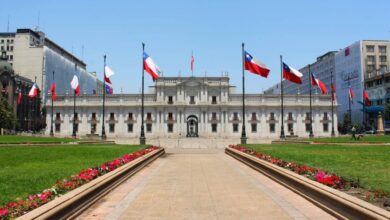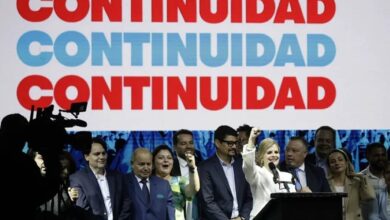In a decisive response to escalating violence and organized crime, Brazil's President Luiz Inácio Lula da Silva has declared a significant security initiative, deploying armed forces to safeguard critical infrastructure and borders. This move reflects a more profound struggle against crime in Latin America's largest country, marking a new chapter in Brazilian law enforcement

Photo: 01/11/2023.- Brazilian President Luiz Inácio Lula da Silva participates in a press conference at the Palácio de Planalto, in Brasilia (Brazil). EFE/ Andre Borges
The Latin American Post Staff
Escucha este artículo
Leer en español: La audaz medida de Brasil: desplegar fuerzas militares para reforzar la seguridad y combatir el crimen organizado
A Sober Turn in Brazil's Vibrant Landscape
In a landscape often marked by vivid festivities and cultural vibrancy, Brazil is currently facing a more somber tune. President Luiz Inácio Lula da Silva announced a significant military deployment to enhance security at crucial transportation hubs and border areas, signaling a renewed, robust stance against organized crime in this sprawling Latin American nation.
This decision emerges in the aftermath of a chilling episode where dozens of buses were torched in Rio de Janeiro by a criminal faction, a stark reprisal against the police for killing a gang leader's nephew. Addressing the nation, Lula described the current situation as "very serious," underscoring the federal government's commitment to support state authorities in combating the deep-rooted issue of organized crime.
Strategic Deployment to Secure Critical Points
The strategic deployment includes around 3,600 personnel from the army, navy, and air force. Their mission focuses on bolstering security measures at critical points, including the international airports in Rio de Janeiro and Sao Paulo, major maritime ports like Santos – Latin America's busiest port and a notorious node in the cocaine export chain.
This initiative is part of a broader strategy that also aims to amplify the federal police presence in Rio de Janeiro, fostering closer collaboration among law enforcement agencies and enhancing the investment in advanced technology for intelligence. By targeting the physical presence and financial infrastructure of these criminal syndicates, authorities hope to "suffocate" the power and influence of these militias.
The Long-Term Challenge of Rio's Security Issues
However, Rio's battle with organized crime isn't a recent phenomenon. Rafael Alcadipani, a public security analyst and professor at the Getulio Vargas Foundation, warns that the complexities of Rio's security issues span decades. He cautions that the results of this latest federal intervention might only be observable in the long term, given the deep-seated nature of these challenges.
Despite this, Justice Minister Flávio Dino asserts that these measures are not merely reactionary. Instead, they culminate ongoing efforts and dialogue with various stakeholders, shaped since Lula's inauguration. This coordinated approach, however, faces an uphill battle in a city where powerful militias, initially formed by ex-police and military personnel for community protection, have now evolved into formidable entities engaged in drug trafficking and other illicit activities.
Calls for Effective Control in the Wake of Tragedy
The turmoil in Rio gained international attention on October 5, with the assassination of three doctors at a beachside bar, mistakenly identified as militia members. This brutal incident has amplified calls for state and federal governments to demonstrate effective control and formulate a coherent strategy to ensure public security in one of Brazil's most iconic cities.
In recent years, Rio's security dynamics have witnessed these militias expanding their activities from extortion and protection rackets to direct involvement in drug trafficking. Such developments reflect a disturbing transformation of these groups, from community vigilantes to influential criminal enterprises, blurring the lines between law enforcers and lawbreakers.
The Challenge of Long-Term Effectiveness
While the latest security measures mark a significant step by the Lula administration in addressing these pressing issues, the long-term effectiveness of these efforts remains to be determined. The intricate web of crime, corruption, and socio-economic disparities makes the fight against organized crime a complex, multifaceted challenge.
Analysts like Alcadipani caution that while the deployment of the military and other immediate actions are critical, they must be part of a sustained, holistic approach to public safety. This includes addressing the root causes of crime, such as poverty, unemployment, and social inequality, and reforming law enforcement and judicial systems to ensure justice and accountability.
Also read: Brazil: New Project To Mitigate Polluting Gases From Cows
Brazil's Crossroads in the Battle Against Organized Crime
Brazil, known for its rich cultural tapestry and vibrant spirit, now stands at a crossroads in its battle against organized crime. The deployment of the armed forces underscores a decisive, albeit initial, step in this prolonged conflict. As the Brazilian government confronts this daunting task, the eyes of the world remain fixed on how these efforts will reshape the country's security landscape and, ultimately, its future.




